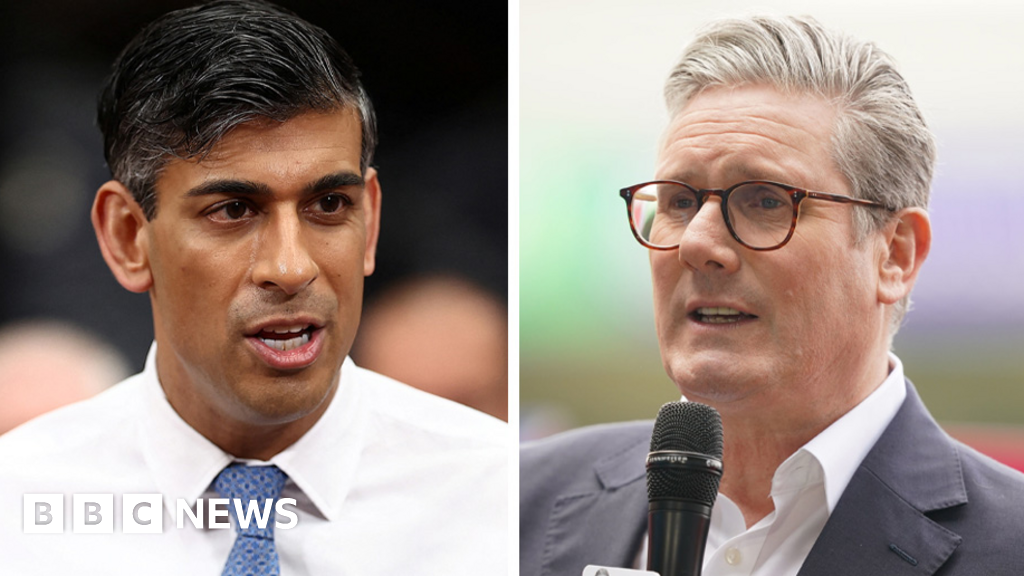World
Party leaders hit the road to make their pitches to voters – BBC News

Image source, Reuters/ PA
Party leaders have spent the first day of general election campaigning setting out their initial pitches to voters.
Prime Minister Rishi Sunak endured a self-inflicted day of geographical masochism as he travelled to England, Scotland and Wales.
Addressing a distribution centre in Derbyshire, he said he had a “clear plan” for financial stability.
Labour leader Sir Keir Starmer kicked off his campaign at Gillingham Football Club in Kent where he said a vote for Labour was a vote to “turn the page”.
One dividing line between the two main parties is their stance on the government’s Rwanda plan.
Sir Keir said he would scrap the scheme to send those arriving illegally in the UK in small boats to the East African country.
Labour say they would set up what they call a ‘Border Security Command’ which they claim would smash the criminal gangs and cut the number getting in small boats over the Channel.
The Conservatives argue they are doing something similar already and Mr Sunak has said the Rwanda plan would deter people from making the dangerous journey.
However, in one of his first interviews after calling the election, the prime minister said no asylum seekers would be deported to Rwanda before the election on 4 July.
It had been thought ministers would try to get the first flight off before polling day, to showcase their policy on countering illegal migration.
In other words, the whole argument is about the prospect of a Rwanda plan if the Conservatives win, and the plan being scrapped before it has even begun if Labour win.
In Edinburgh, the newly-elected SNP leader John Swinney urged Scottish voters to make “their voice heard”.
He said that while his Labour and Conservative opponents would be going “hammer and tongs to discredit each other” he would be going “hammer and tongs” for Scotland.
Liberal Democrat leader Sir Ed Davey headed to Cheltenham in Gloucestershire where he repeated his key message – promising voters a “fair deal”.
Reform UK said it would field candidates in 630 of the UK’s 650 constituencies – however Nigel Farage, the party’s founder, will not be one of them.
He said he would be “do my bit to help” but also hinted he wanted to focus on the US presidential campaign of his friend Donald Trump.
While one former party leader is sitting this election out, another is expected to throw his hat in the ring.
Jeremy Corbyn – who led Labour from 2015 to 2020 – looks set to announce he will stand in his current constituency of Islington North as an independent candidate.
The unexpected timing of the general election has prompted a flurry of MPs to say they will be standing down.
Deputy speaker of the House of Commons Dame Eleanor Laing, transport minister Huw Merriman and former Labour defence minister Kevan Jones all confirmed they would not be contesting the election.
While party leaders were fanning out across the country, there was still some activity going on in Westminster.
The government and opposition parties were engaged in talks over which bills they could rush through before Friday – the day when Parliament effectively shuts down for the election.
A bill to overturn the convictions of sub-postmasters caught up in the Horizon computer scandal got through.
A victims bill authorising payments to those affected by the infected blood scandal should pass on Friday, as should the Leasehold and Freehold Reform Bill.
However, other bills – including Mr Sunak’s flagship policy to prevent anyone born after 2009 from legally smoking – appears likely to be shelved.
Legislation aimed at delivering a Tory manifesto promise to ban “no fault” evictions in England, and to set up a regulator for English football are also unlikely to get passed before the cut-off.







:max_bytes(150000):strip_icc()/roundup-writereditor-loved-deals-tout-f5de51f85de145b2b1eb99cdb7b6cb84.jpg)


